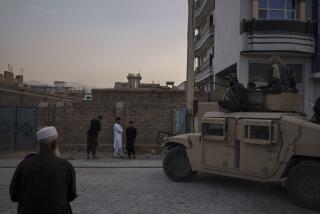Pakistan warns that U.S. accusations may cost Washington an ally
- Share via
Reporting from Islamabad, Pakistan — Pakistani officials warned Friday that they could jettison the United States as an ally if American officials continued to accuse Islamabad’s intelligence agency of assisting a leading Afghan Taliban group in recent attacks in Afghanistan.
Foreign Minister Hina Rabbani Khar cautioned the U.S. against airing allegations such as the blunt charge of collusion between Pakistan’s Inter-Services Intelligence agency, known as ISI, and the militant Haqqani network made Thursday by Adm. Michael G. Mullen, chairman of the Joint Chiefs of Staff, before the Senate Armed Services Committee.
“You cannot afford to alienate Pakistan; you cannot afford to alienate the Pakistani people,” Khar said in New York, speaking to a Pakistani television channel. She was in the U.S. for the U.N. General Assembly session.
Pakistani army chief Gen. Ashfaq Kayani in a statement called Mullen’s remarks “very unfortunate and not based on facts.”
Pakistani officials continued to tersely reject the allegations and challenged the U.S. to furnish evidence of ties between the country’s intelligence community and the Haqqani group.
Mullen called the Haqqani network “a veritable arm” of the ISI and said the intelligence agency helped Haqqani militants during attacks Sept. 13 on the U.S. Embassy in Kabul as well as a truck bomb blast in Wardak province three days earlier that injured 77 American troops.
U.S. military officers and former officials say ISI communicated with Afghan insurgents who attacked the U.S. Embassy and NATO headquarters nearby and appears to have provided them with equipment.
Estimated to number more than 10,000 fighters, the Haqqani network uses Pakistan’s North Waziristan tribal region along the Afghan border to launch suicide bombings, commando-style assaults and other strikes on U.S., Afghan and North Atlantic Treaty Organization forces in eastern Afghanistan and in the capital, Kabul.
The group has never carried out any attacks against targets in Pakistan. The country’s links with the Haqqani network date to the Soviet occupation of Afghanistan in the 1980s, when the ISI backed the group’s founder, Jalaluddin Haqqani, and other resistance fighters.
Mullen’s allegations probably will widen the chasm between Pakistan and the U.S., tenuous allies whose mutual mistrust deepened considerably this year. The U.S. commando raid in May that killed Osama bin Laden in the city of Abbottabad raised questions in Washington about whether elements of the Pakistan’s intelligence agencies knew that the Al Qaeda leader had been hiding for five years just a few miles north of the capital, Islamabad. The January arrest of CIA contractor Raymond Davis, accused of shooting to death two Pakistani men he said were trying to rob him, sparked fear among Pakistanis that scores of CIA operatives were secretly roaming the country.
To get Pakistan to act against the Haqqani network, Washington has signaled a willingness to link future financial aid with Islamabad’s cooperation against extremists, and has hinted that it could even mount some kind of unilateral, targeted strike on Haqqani strongholds in Pakistani territory.
In Karachi, Prime Minister Yousuf Raza Gilani told reporters that the onus was on Washington to pull back and begin mending frayed relations between the two countries.
“They can’t live with us; they can’t live without us,” Gilani said. “So I would say to them that if they can’t live without us, they should increase contacts with us to remove misunderstandings.”
Security analyst Javed Hussain, a retired Pakistani brigadier, said a U.S. strike on Haqqani would backfire, given the array of militant groups beyond the Haqqani network that also use North Waziristan as a base of operations.
“It would be a strategic blunder,” Hussain said. “North Waziristan is a hornet’s nest.... They would all converge and coordinate activities against the U.S. Can [Defense Secretary Leon E.] Panetta or President Obama afford to open another front under the present circumstances? If he does, good luck to him.”
Experts say no measure may be enough to prod Pakistan’s security establishment into severing ties with the Haqqani group. The military views the militant network as a valuable asset in a post-U.S. Afghanistan to prevent nuclear archrival India from extending its influence to Kabul. Pakistan’s military and intelligence chiefs have always regarded India, and not Islamic extremists, as their primary enemy.
Pakistan’s military leaders, says security analyst and former Pakistani Gen. Talat Masood, “do feel that the policy they are pursuing is, in the long term, in their interest.... There are others in Pakistan who believe this association with the Haqqani network is extremely detrimental to Pakistan’s interests. But they are in the minority.”
More to Read
Sign up for Essential California
The most important California stories and recommendations in your inbox every morning.
You may occasionally receive promotional content from the Los Angeles Times.













